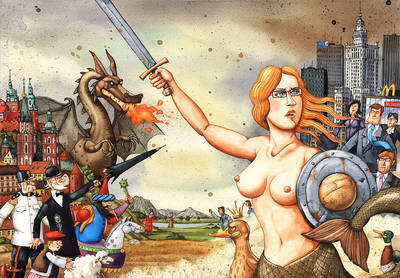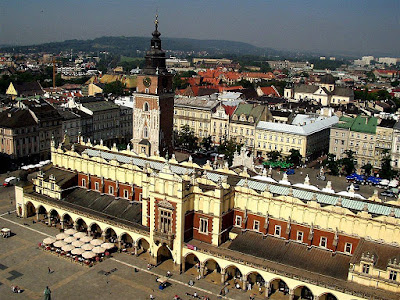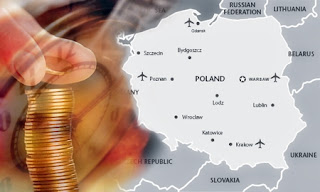Poland is undergoing a period of a second 'economic miracle'. Despite the crisis, the country continues to record economic growth. The political situation in that country is the most stable in the history of modern Poland - that 'Guardian' shows our country.
Journalists UK's largest left-wing daily - Julian Borger and Helen Pidd - visited Poland and in the report 'New Europe' have described a cross our country. How do they see and evaluate us?
Economy forward, the policy of stable
Their observations may be surprising to many. The economy of our country seen from the outside is doing quite well. According to Borger and Pidd, Poland is undergoing a period of a second 'economic miracle'. - Despite the crisis, the country continues to record economic growth - they write. Our political situation has been characterized as 'the most stable in modern Polish history'. According to British journalists, coalitions in our parliament are extremely short-lived, as everything revolves around 'two-horse race' - the PO and PiS. There is not a word about the SLD, PSL, and PJN.
Characteristics of the Law and Justice focuses on the Kaczynski brothers. - Lech was killed in plane crash near Smolensk. His brother believes it was more than coincidence - assess the journalists. In order to represent to the British what is the power of the Polish president, they resort to the metaphor - he is stronger than in Germany, weaker than in France. In the passage devoted to Polish politics will find digression on the LPR and Self-Defense. According to Borger and Pidd their names refer to the 'old days', or PRL.
Foreign Policy - is differently, but Sikorski said improvements
According to British journalists, the Polish foreign policy is mainly based on historical experience of our country, invaded many times by the neighbors. - Moments of a test the Poles survived after the plane crash near Smolensk, where, together with the Russians, the memory of the murdered in Katyn was to be honored - they write.
Then the authors point out that everything is moving towards the better because Radoslaw Sikorski said that 'historical resentments should be put aside'. According to them, it is unclear whether this will change quite a negative attitude to the Polish neighboring countries. The authors focused primarily on the Polish relations with Russia and Germany apart from other neighboring countries such as the Czech Republic, Slovakia, Ukraine, Lithuania and Belarus, as well as the fact that foreign policy is not confined to border states.
'Whites, Catholics, a minority of mostly German'
'In Poland, there live about 40 million people and the population is declining '- the authors write. Borger and Pidd blame for that the Poles who left 'for profit' to other European countries (the most common direction of migration is still the United Kingdom - ed.) 'Guardian' Journalists believe that our government has not sufficiently madesure that young migrants have something to go home to.
The authors rely on the data from 2002, according to which the largest national minorities in Poland are Germans, Belarusians and Ukrainians. However, if verified what is the case now, they could write that into our country receives a large number of such Vietnamese, Nigerians, and Chechens. In one, however, they are right. 'Poland is a country dominated by whites, Catholics' - they write.
Polish history begins in the nineteenth century
- History does not treat Poland gently. Sticking between Germany and Russia turned out to be almost impossible - believe Borger and Pidd. It turns out that according to them our 'commonwealth' (term used toward the British Commonwealth - ed) has been divided into parts by Russia, Prussia and Austria. You can guess that it is a Polish-Lithuanian Commonwealth, whose structure, however, strongly differed from the system of the British Empire.
What happened next in the pages of Polish history? The authors write: 'After a period of partition, was 'Miracle of the Vistula' and the power was taken over by the hero Pilsudski, who carried out the coup. - 'Everything that happened next was 'absolute disaster' - the start of World War II is defined.
- Hitler and Stalin, turned Poland into the field of death. They killed six million Poles - three millions of Jews and three millions of Catholics - succinctly about the Holocaust capture the authors of the article. Interestingly, according to Borger and Pidd after the war Poland was 'swallowed by Stalin', who suppressed yet another revolution in Poland.
This situation lasted until a well-known electrician came on the yard wall of Lenin and called on workers to strike. - Lech Walesa and the 'Solidarity' contributed to the collapse of the communism in Eastern Europe, and now the Poles do not allow anyone to forget about it - here, British journalists are not mistaken.
We are pessimistic, hospitable, and are not afraid to be silent
- Polish psyche is not too optimistic. This may be due to years of oppression and successive invasions. Pessimism is even visible at the Polish anthem - say journalists referring to the passage: 'Poland has not perished. '
The authors of material on our country will endeavor to make the nature of Polish society from the standpoint of the average Briton. They warn his countrymen that, in our country's polite question, 'How are you?', which in England always match up, 'Okay. Thank you.' - Here we can hear the ominous 'old poverty'.
What do Borger and Pidd separates us from the Brits? First of all, less than they we fear the awkward silence. Additionally, we are generous, hospitable and proud that our country has endured all the misery.
They are chivalrous and do not talk openly about sex
- Men in Poland are romantic, but they rather welcome a woman by giving her hand in greeting instead of kissing her hand. In addition they are gallant and meet the expectations of Polish women who want to be passed through the door and given flowers. Poles are practicing premarital sex, but rather not talk about it loudly. The exception is the secularized Warsaw. Many parents are often unhappy when their children want to live with their partners before marriage.
- Abortion is illegal in Poland, and contraception inadequately promoted. Sex education is still regarded euphemistically, and homophobia is quite a serious problem. However, there is a little hope - this year the ruling party has expelled from its ranks one of the MPs (Robert Wegrzyn - eds.), who spoke some offensive comments about lesbians - so the authors evaluate the Poles in the paragraph entitled 'Love and sex.'
Zurek, Doda and 'they have the X-Factor!'
After reading the article of Borger and Pidd a conclusion arises- we have a big problem with the promotion of our cultural assets. During the visit to Poland, most British journalists rushed into the eyes of Doda (equivalent of Birtney Spears ), and for the most popular band they saw Kult. Most programs are, according to them, 'Dancing with the Stars' and invented by Briton Simon Cowell 'X-Factor' ('They have it too!').
As for our cooking, dumplings, sausages and soup are recommended as a classic. After mentioning that we eat lots of kebabs the topic of the delicious and easy to prepare roasted sandwich arises. To all this, we of course drink vodka and beer.
The condition of Polish cinema is, however, according to Borger and Pidd, very good. According to the section 'A Brief History of Polish cinema' the Poles like to watch Hollywood blockbusters, but have a very good film school, from which derive such personalities as Polanski, Kieslowski and Wajda.










